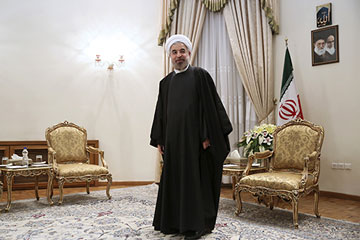
President Rouhani holds the key to Irans economic revival.
(3 of 6)
Many of the clergy in the world's only modern theocracy are also preaching a different line. Mohsen Gharavian, a theologian in the holy city of Qum, campaigned for ultra-conservative Mahmoud Ahmadinejad in 2005. But he too favors renewing U.S. relations--and even a visit from President Obama. "The nuclear deal is very positive and a step forward," he says. "We cannot always be in a position of argument and animosity with the U.S."
So, I ask him, why are there still shouts of "Death to America" during the celebrated Friday prayers at Tehran University? "This slogan has a long history," he says. "Removing it depends on what the U.S. government does." Like the rest of the population, he adds, the majority of clerics in Qum voted for Rouhani.
Man With the Key
During the presidential election last summer, Rouhani's supporters nicknamed their candidate Hassan Kilidsaz, or Hassan the Locksmith. He won the six-way race decisively, Tehran University political scientist Nasser Hadian explains, because voters decided he could "make a key that would open the door" after eight dark years of the bellicose Ahmadinejad.
After six months in office, Rouhani may already rank as the most powerful President since the revolution. His candor has startled even close advisers. He tapped smart technocrats to rescue the imploding economy after acknowledging on national TV that the state coffers were almost empty. His government has since stemmed the slide of Iran's currency, which had plummeted 60% since 2011. Inflation has begun to climb down from a high of more than 40%. He has won favor among women, tweeting that a woman's dress does not define her piety. And he has charmed young Iranians, shedding his white turban and clerical robe for a baseball cap and parka to take weekend hikes in the Alborz Mountains that overlook Tehran.
Most of all, Rouhani has nimbly navigated Tehran's venomous politics better than his predecessors. He has so far kept the Supreme Leader, Ayatullah Ali Khamenei, on his side--unlike the wily but ultimately marginalized Hashemi Rafsanjani. He has straddled the political spectrum, unlike the mild-mannered reformist Mohammed Khatami or the Holocaust-denying Ahmadinejad. In the process, he has carved out a new centrist category of political realists.
Many of Rouhani's priorities reflect changes that the U.S. would like to see in Iran, especially on personal freedoms and censorship. He has chastised state TV for ignoring Iran's biggest problems. "When IRIB airs the birth of a panda in China but nothing abt unpaid workers protesting, obvious that ppl & youth will ignore it," read a July 3 tweet from Rouhani's account. In October, the Scottish-educated cleric even exchanged tweets with Twitter co-founder Jack Dorsey. Dorsey asked Rouhani, "Are citizens of Iran able to read your tweets?" Rouhani replied, "my efforts geared 2 ensure my pp'll comfortably b able 2 access all info globally as is their #right." The fuller answer is that Iranians still have to bypass state-controlled servers to access most social media. But by speaking out on Twitter and Facebook, Rouhani has pressured branches of government he does not control on many issues.
